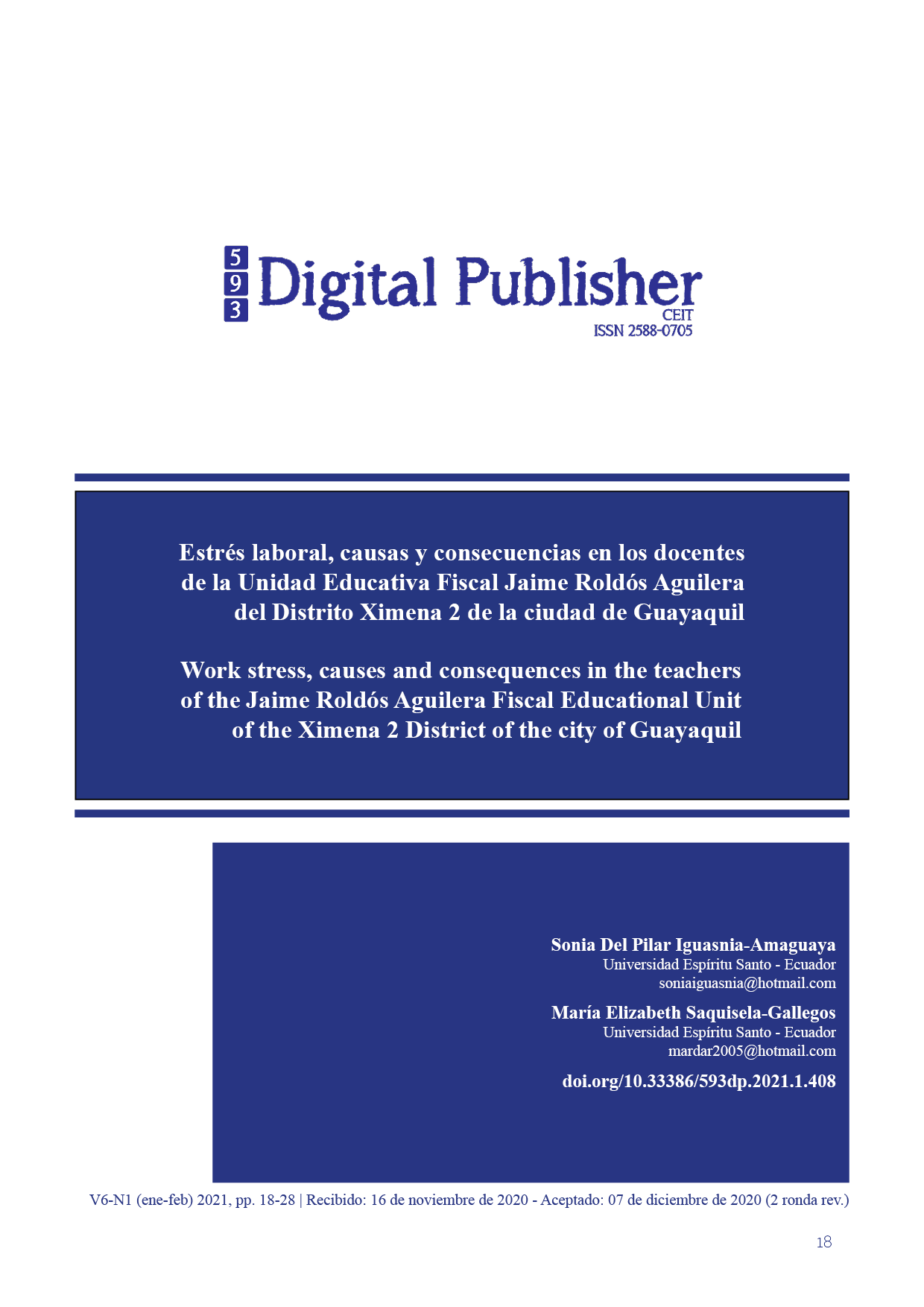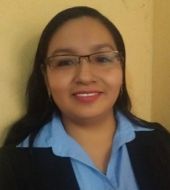Work stress, causes and consequences in the teachers of the Jaime Roldós Aguilera Fiscal Educational Unit of the Ximena 2 District of the city of Guayaquil
Main Article Content
Abstract
This research allows us to contribute with a coping strategy based on the BAPNE method that allows us to diminish the labor stress of the teachers produced by different factors such as depression, alteration, anxiety, frustration, exhaustion, insomnia, lack of motivation and health problems that generate behavioral changes affecting the interpersonal relations both in the labor and family environment, therefore it also has repercussions in the style and quality of life of the teachers.
In educational institutions there have been cases of eustress and distress, when the individual manages to adapt to the changes and demands of the system in a favorable way becomes a proactive entity, on the contrary people with distress that do not have a control of their emotions can collapse in their work performance and move to a chronic stage of stress called burnout.
To achieve the objective we will apply the Historical, Logical and Causal methods, we will also apply the scientific observation through the survey, besides the empirical method because it allows us to obtain information based on the experience, managing to develop our work in a systematic way through the collection, analysis and interpretation of the data, assuring the confidentiality of the information, allowing to obtain valid and reliable results that will help us to sustain our scientific work.
Downloads
Article Details

This work is licensed under a Creative Commons Attribution-NonCommercial-ShareAlike 4.0 International License.
1. Derechos de autor
Las obras que se publican en 593 Digital Publisher CEIT están sujetas a los siguientes términos:
1.1. 593 Digital Publisher CEIT, conserva los derechos patrimoniales (copyright) de las obras publicadas, favorece y permite la reutilización de las mismas bajo la licencia Licencia Creative Commons 4.0 de Reconocimiento-NoComercial-CompartirIgual 4.0, por lo cual se pueden copiar, usar, difundir, transmitir y exponer públicamente, siempre que:
1.1.a. Se cite la autoría y fuente original de su publicación (revista, editorial, URL).
1.1.b. No se usen para fines comerciales u onerosos.
1.1.c. Se mencione la existencia y especificaciones de esta licencia de uso.
References
Arrigoni, F. (2020). Burnout en personal docente y no docente de una escuela albergue de Mendoza. PERSPECTIVAS EN PSICOLOGÍA, 17(1), 32-42.
Astorquiza Bustos, B. A., Castillo Caicedo, M., & Gómez Mejía, A. (2020). Job stress in the labor market: an application of the fuzzy set measurement method for the Colombian case. Lecturas de Economía(93), 189-224.
Cháidez Nevárez, J., & Barraza Macías, A. (2018). Afrontamiento al estrés y su relación con el tipo de jornada laboral en docentes de educación primaria. Informes Psicológicos , 18(2), 63-75.
Cladellas Pros, R., Castelló Tarrida, A., & Parrado Romero, E. (Febrero de 2018). Satisfacción, salud y estrés laboral del profesorado universitario según su situación contractual. REVISTA DE SALUD PÚBLICA, Volumen 20.
Félix Verduzco, R. O., García Hernández, C., & Mercado Ibarra, S. M. (2018). EL ESTRÉS EN EL ENTORNO LABORAL: Revisión genérica desde la teoría. Cultura Científica y Tecnológica(64).
Frosch, C. A., Mitchell, Y. T., Hardgraves, L., & Funk , S. (2019). Stress and coping among early childhood intervention professionals receiving reflective supervision: A qualitative analysis. Salud mental infantil J., 40, 443–458.
López Walle, Jeanette, Tristán, José, Tomás, Inés, . . . M. del Rocío. (2020). Estrés percibido y felicidad auténtica a través del nivel de actividad física en jóvenes universitarios. Cuadernos de Psicología del Deporte, 20, 265-275.
Merino Tejedor, E., & Lucas Mangas, S. (2016). La autoeficacia y la autorregulación como variables moderadoras del estrés laboral en docentes de educación primaria. Univ. Psychol., 15(1), 205-218.
Monterrosa Castro, Á., Dávila Ruiz, R., Mejía Mantilla, A., Contreras Saldarriaga, J., Mercado Lara, M., & Flores Montesdeoca, C. (2020). Estrés laboral, ansiedad y miedo al COVID-19 en médicos generales colombianos. Revista de la facultad de ciencias de la salud, 23, 195-213.
Moral Bofill, L., Vicedo Molla, F., & Romero Naranjo, F. J. (2020). Estudio piloto de variables socio-emocionales, ansiedad y flow en alumnos de grado profesional de música mediante actividades BAPNE. Educatio Siglo XXI, 38(2), 193-212.
Moran Jarquin, M. (2020). ESTRÉS LABORAL COMO GENERADOR DE CONFLICTOS ESCOLARES EN EL AULA A NIVEL PREESCOLAR. Revista Mexicana de Orientación Educativa, 27-32.
Muñoz Martínez, I. M. (2016). Estrés laboral: Revisión en el periódico “El Mundo”. Revista Española de Comunicación en Salud., 29-34.
Obando Mejía, I. A., Calero Morales, S., Carpio Orellana, P., & Fernández Lorenzo, A. (2017). Efecto de las actividades físicas en la disminución del estrés laboral. Revista Cubana de Medicina General Integral., 342-351.
Obregón Vite, G. A. (Octubre de 2019). Propuesta de investigación para la implementación de un Programa de Activación Física para disminuir el Estrés Laboral en docentes de la Escuela Superior Politécnica de Chimborazo (ESPOCH). Revista Dilemas Contemporáneos: Educación, Política y Valores.(Edición Especial ).
Palacios Sánchez, B. M., & Pernas Álvarez, I. A. (2019). ESTRÉS Y BURNOUT EN DOCENTES DE LA FACULTAD DE PSICOLOGÍA. Revista Cubana de Educación Superior, 38(Especial).
Prada Ospina, R. (2019). Social psychological factors and their relation to work-related stress as generating effect of burnout. INTERDISCIPLINARIA, 39-53.
Ramos Narváez, A., Coral Bolaños, J., Villota López, K., Cabrera Gómez, C., Herrera Santacruz, J., & Rivera Porras, D. (2020). Salud laboral en administrativos de Educación Superior: Relación entre bienestar psicológico y satisfacción laboral. AVFT Archivos Venezolanos de Farmacología y Terapéutica, 39(2).
REAL ACADEMIA ESPAÑOLA. (2019). Edición del Tricentenario. Recuperado el 23 de octubre de 2019, de https://dle.rae.es/estr%C3%A9s
Romero Naranjo, F. (2015). Fundamentos de la percusión corporal como recurso para la estimulación cognitiva, atención y memoria - Método BAPNE. Investigación y Propuestas Innovadoras de Redes UA para la Mejora Docente.
Salazar Becerril, A. (2015). Salud, burnout y estrés en ámbitos laborales. Una revisión sistemática. Psicología y Salud, 25(2), 147-155.
Suárez Martel, M. J., & Martín Santana, J. D. (2019). INFLUENCIA DEL PERFIL SOCIODEMOGRÁFICO DEL PROFESORADO UNIVERSITARIO SOBRE LA INTELIGENCIA EMOCIONAL Y EL BURNOUT. Educación XX1, 93-117.



